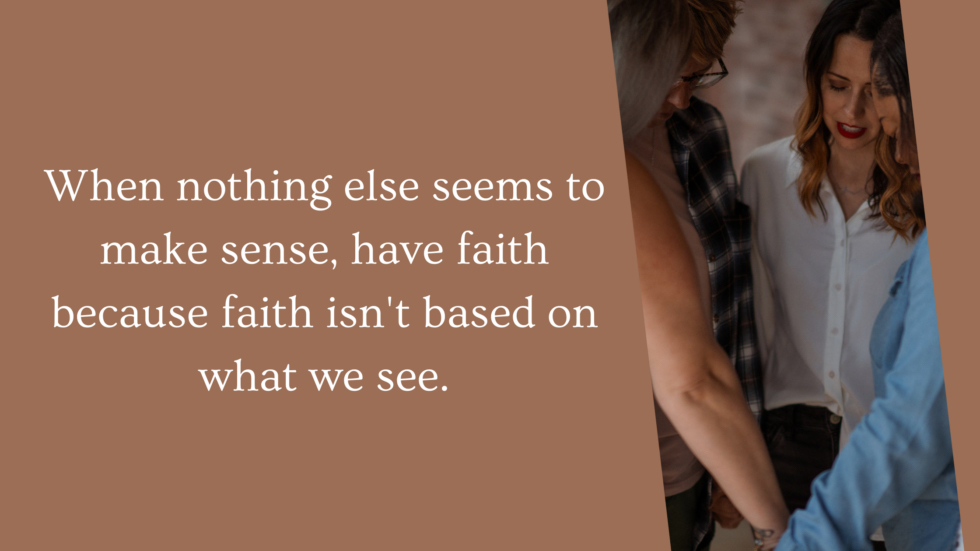Trusting the process and having faith in God are comforting anchors that provide guidance in the intricate journey of life. During life’s uncertainties and challenges, placing our trust in God offers a profound sense of purpose, courage, and strength.
This journey goes beyond mere belief, influencing our perspectives, desires, and actions. Embracing this mindset entails surrendering to the unfolding path with patience and acknowledging God does care about our lives and has a plan that surpasses our understanding.
By the way, what if I told you your feelings aren’t inherently bad or sinful? You don’t need to fear or suppress them. They can be a guide. If you’re interested, I have a free 3-day study on living by faith while processing emotions. Check it out here!
What Does Trust the Process Mean
Trusting the process with faith means accepting the uncertainties that life brings. It’s about surrendering to the journey, even when the destination is unclear. Adopting this mindset develops a compassionate understanding that personal growth and healing happen, but they are not linear. It requires patience, resilience, and a strong belief that God has a plan for our lives.
Trusting the process is an active choice to face life’s challenges with an open heart, believing that even in tough times, a purposeful unfolding leads to us becoming more like Jesus.
How Do We Trust The Process
From a biblical perspective, trust in the process involves placing faith in God’s plan and divine timing. It is rooted in the belief that God, as the ultimate orchestrator of our lives, has a purpose for each individual.
Proverbs 3:5-6 encourages us to “Trust in the Lord with all your heart and lean not on your own understanding; in all your ways submit to him, and he will make your paths straight.” This biblical wisdom underscores the importance of surrendering control and relying on God’s guidance.
Patience and perseverance are virtues celebrated throughout the Bible, emphasizing the notion that God’s timing is perfect. Romans 8:28 reassures believers, “And we know that in all things God works for the good of those who love him, who have been called according to his purpose.” Trusting in the process involves anchoring one’s faith in the belief that God’s plan unfolds with divine wisdom, even when circumstances may seem unclear or challenging.
When nothing else seems to make sense, have faith because faith isn’t based on what we see.
The Process of Trusting God
Trusting in God is a profound and spiritual process that involves surrendering our will to His. It encompasses faith and action, grounded in the belief that God’s plan is greater than our understanding. The process of trusting in God begins with acknowledging His sovereignty and wisdom and recognizing that God is in charge but not in control. (We are not His puppets, and He has given us free will.)
Firstly, it involves cultivating a strong and unwavering faith through prayer, reflection on scripture, and seeking guidance in times of uncertainty. Trusting in God and, in the process, means relying on His promises and making a conscious choice to let go of worries, placing them in God’s hands. (Which I know isn’t always easy to do. We want to control what feels out of control, don’t we?)
Trusting in God, in the process, also requires patience and an acceptance of His timing. It involves understanding that God’s plans may not align with our immediate desires, but His timing is perfect and He is not slack in His time. This process entails waiting with hope and maintaining faith even when circumstances seem challenging.
Additionally, trusting in the process with God involves obedience to His commandments and a willingness to follow His guidance. It’s about aligning one’s actions with God’s principles and relying on His strength in times of weakness. We have to remember that God operates out of love and all things good even when things don’t feel good to us.
The process of trusting in God is a continual journey of deepening faith, surrender, patience, and obedience. This won’t be a place we arrive at. There is no destination but a continual journey with God as long as we are on this earth.
Learning to Trust God
Proverbs 3:5-6 says, “Trust in the Lord with all your heart and lean not on your own understanding; in all your ways submit to him, and he will make your paths straight.”
Trusting God is simply believing that He loves you and knowing He’s good, He has the power to help you, and He wants to help you.
Let’s look at Genesis 16, 17, and 18 to learn why trusting God is important.
- He’s the God who sees El Roi.
In Genesis 16, Sarai becomes impatient about bearing a son and decides to have Abram sleep with her maid to bare her a son. Genesis 16:4 says, “when she (Sarai) knew she (Hagar) was pregnant, she (Sarai) began to despise her mistress.” From there, we see Sarai treating her mistress wrong, and Hagar flees.
An angel of the Lord found her, met with her, and told her to return and she would be blessed. After the angel of the Lord told her this, she called on the name of the Lord who spoke to her, “You-Are-the-God-Who-Sees.
Genesis 16:13 says, “She gave this name to the Lord who spoke to her: “You are the God who sees me,” for she said, “I have now seen the One who sees me.”
- Our hearts are not hidden from God.
God is making Abraham a promise, an intimate covenant, promising him nations and descendants, and he is wrestling with the idea of having a kid at his age. Something I’m sure was near to his heart.
Genesis 17:17 says, “Abraham fell facedown; he laughed and said to himself, “Will a son be born to a man a hundred years old? Will Sarah bear a child at the age of ninety?”
Abraham’s laugh was not a laugh of disbelief but overwhelmed joy. In Genesis 18:11-15, Sarah laughed, but it was not the same. She did it in scorn, doubting that she could conceive at her age. The Lord named the promised seed Isaac (Genesis 17:19), which means “laughter,” because of Abraham’s response.
The Lord calls to Abraham and asks why Sarah is laughing. She knew the Lord heard what was in her heart because when she is confronted, verse 15 says, “she denied it because she was afraid.”
- There’s nothing that can’t be redeemed or restored by God.
We see this tension, this lack of patience throughout Genesis. Our lack of patience or our timeline is when we stop trusting God. I think we begin to lose trust when we lack patience.
We see this with Sarah and Abraham, wondering how they will be able to have a child. “How is it possible?” they ask the question.
Remember, when it comes to trusting God, we can trust Him because:
He’s constant.
He’s faithful.
He’s holy.
He’s omniscient (all-knowing).
He’s omnipotent (all-powerful).
He’s omnipresent (present everywhere).
Why It’s Important to Trust the Process and Have Faith
Trusting the process and having faith, particularly in God’s plan, holds profound significance in shaping our desires and wants to align with His desires and wants. By surrendering our own will to God’s guidance, we open ourselves to a transformative journey where faith plays a pivotal role.
In this process, our trust in God’s timing becomes crucial. Instead of impatiently pursuing immediate gratification of our desires, we learn to wait with hope and faith that God’s timing is perfect. This patient waiting helps reshape our aspirations, aligning them with a broader, more profound understanding of His purpose for our lives.
Furthermore, trusting in God’s plan encourages us to view challenges not as obstacles but as opportunities for growth and learning. I like to say with my coaching clients that they are nothing more than invitations to go to the Father. As we lean on our faith during difficult times, our desires begin to shift from self-centered pursuits to a more aligned and purposeful direction guided by God’s desires.
Therefore, trusting the process with God fosters a transformation in our desires, cultivating a deeper sense of purpose and direction. It allows our wants to align with His plan, shaping our character, relationships, and aspirations in ways that reflect His wisdom and love. This alignment brings a profound sense of peace and fulfillment and strengthens our faith as we journey through life with a trustful and surrendered heart.
In strengthening our trust in God and the process, there are several intentional steps we can collectively take to deepen our connection with faith:
- We Pray and Meditate: Regularly engaging in prayer and moments of meditation creates a shared space for communication with God. Through these practices, we seek guidance and find solace in our shared faith.
- We Study Scripture: We immerse ourselves in the study of religious texts and scriptures. Regular reflection on these teachings deepens our understanding of God’s character, His promises, and wisdom.
- We Develop Patience: Building trust in the process creates patience. We understand that God’s timing may differ from our own, and we can embrace this truth, allowing for spiritual growth.
- We Reflect on Past Experiences: We reflect on past challenges and victories, recognizing the hand of God in our experiences. We acknowledge His presence in our past; we build confidence in His ability to guide us through future situations.
- We Practice Gratitude: We cultivate grateful hearts, shifting our focus from what is lacking to what has been provided. We acknowledge and appreciate our blessings and reinforce our trust in God’s benevolence.
- We Stay Connected with Faith Communities: Surrounding ourselves with a supportive faith community provides mutual encouragement, shared values, and a sense of belonging. Regular participation in gatherings and events strengthens the communal aspect of our faith.
- We Engage in Continuous Learning: We stay open to continuous learning and spiritual growth. Our participation in classes, workshops, and discussions deepens our understanding, contributing to a more robust faith.
By incorporating these steps into our lives, we foster a stronger trust in God and the process, leading to a more resilient and purposeful spiritual journey with our faith.
Scriptures on Trust
Here are 10 scriptures on trust to encourage you in the process:
- Proverbs 3:5-6 (ESV): “Trust in the Lord with all your heart, and do not lean on your own understanding. In all your ways acknowledge him, and he will make straight your paths.”
- Psalm 37:3-5 (ESV): “Trust in the Lord, and do good; dwell in the land and befriend faithfulness. Delight yourself in the Lord, and he will give you the desires of your heart. Commit your way to the Lord; trust in him, and he will act.”
- Isaiah 26:3-4 (ESV): “You keep him in perfect peace whose mind is stayed on you, because he trusts in you. Trust in the Lord forever, for the Lord God is an everlasting rock.”
- Jeremiah 17:7-8 (ESV): “Blessed is the man who trusts in the Lord, whose trust is the Lord. He is like a tree planted by water, that sends out its roots by the stream and does not fear when heat comes, for its leaves remain green, and is not anxious in the year of drought, for it does not cease to bear fruit.”
- Psalm 118:8-9 (ESV): “It is better to take refuge in the Lord than to trust in man. It is better to take refuge in the Lord than to trust in princes.”
- Proverbs 29:25 (ESV): “The fear of man lays a snare, but whoever trusts in the Lord is safe.”
- Psalm 62:8 (ESV): “Trust in him at all times, O people; pour out your heart before him; God is a refuge for us.”
- Nahum 1:7 (ESV): “The Lord is good, a stronghold in the day of trouble; he knows those who take refuge in him.”
- Psalm 56:3-4 (ESV): “When I am afraid, I put my trust in you. In God, whose word I praise, in God I trust; I shall not be afraid. What can flesh do to me?”
- Proverbs 16:20 (ESV): “Whoever gives thought to the word will discover good, and blessed is he who trusts in the Lord.”





